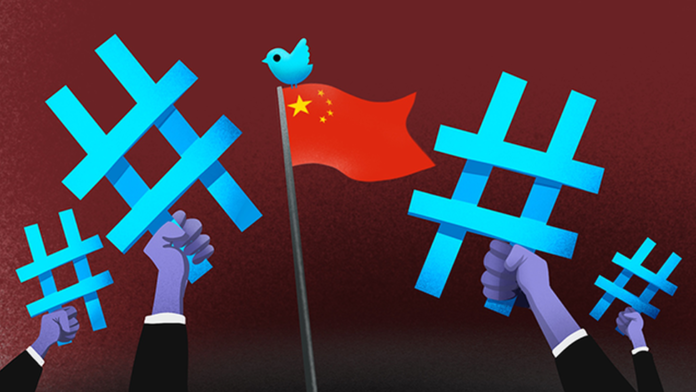Twitter has emerged as a powerful social media tool/platform in the 21st century’s modern diplomacy. Chinese diplomatic offices and their personnel have increased their presence on Twitter to promote their narrative and propaganda with a global audience. Chinese diplomatic activities on Twitter have received global media attention and shaped media debates in recent times. Twitter was banned in China for its citizens in 2009, just two days before the 20th anniversary of the crackdown on democracy protests in Tiananmen Square. The selection and choice of Twitter as a social media tool for Chinese diplomacy is interesting, while Chinese authorities have jailed nearly 50 people in China for using social media platforms like Twitter in the last three years. Similarly, Two Huawei employees were punished after posting an official tweet via Apple iPhone in 2019. In these circumstances, some of the Chinese diplomats have gathered millions of followers on Twitter.
By Kota Mallikarjuna Gupta
Zhao Lijian, Spokesman of Ministry of Foreign Affairs (MoFA), China, started his Twitter Account in May 2010, when he was posted as First Secretary at the Embassy of the People’s Republic of China in the United States America during 2009-13. There was only one Twitter account created every year by the Chinese diplomatic community during 2010-14. China’s MoFA started its Twitter account in October 2019, and its first tweet was posted online on December 2, 2019. Chinese diplomacy expanded its Twitter presence in 2019 with 19 Twitter accounts for Chinese diplomats, and 13 Twitter accounts for Chinese embassies/ consulates.
South Asian countries received high priority from the Chinese Diplomatic community to create and operate Twitter accounts. Chinese Embassy in Pakistan, located in Islamabad, was one of the initial Chinese Embassy/consulates to operate a Twitter in September 2015 itself. Additionally, Zhao Lijian served as Counsellor, Minister-Counsellor, Embassy of the PRC in Pakistan during 2015-19 when the Chinese Embassy in Pakistan started its Twitter account. Chinese Consulate in Lahore is the only Chinese diplomatic office in South Asia that is yet to start and operate a Twitter account by some diplomatic official/ office in October 2021. The Consul General of the PRC started the most recent Chinese diplomatic Twitter account in South Asian countries in Mumbai in September 2021.
Bangladesh and Sri Lanka are two South Asian countries where Chinese diplomatic Twitter accounts were operational only after the rapid spread of Coronavirus from Wuhan in November 2019. Similarly, seven Twitter accounts of Chinese diplomacy in South Asian countries started their tweets only after November 2019. Pakistan and Afghanistan are South Asian countries to have Chinese diplomatic Twitter accounts before India. Chinese Ambassadors in Nepal and Maldives started their Twitter accounts together in June 2019.
Apart from narrating the “China Story” to the global social media users through the Twitter platform and disseminating Beijing’s perspective on international affairs, Chinese diplomats constantly defend China’s policies on Xinjiang and Hong Kong and counter Western narratives on Chinese telecom company Huawei. Zhao Lijian, as China’s deputy chief of mission in Islamabad, frequently challenged former American President Trump and other U.S. officials on Twitter. He has significantly increased his Twitter followers after the bitter argument with Susan Rice, former U.S. National Security Adviser, in July 2019. Another Chinese diplomat posted in Pakistan, Zhang Heqing, as Cultural Counsellor at the Chinese embassy, faced backlash from Pakistani people after posting a video of a Chinese woman belly dancing on Twitter with a caption “Off your hijab, let me see your eyes #Xinjiang dance” in March 2021.
Chinese Embassy Spokespersons in India like Wang Xiaojian and Ji Rong have warned Indian media about their coverage of Taiwan, Xinjiang, and Coronavirus issues during 2020-21 through their tweets. Similarly, some individuals and Indian media agencies, which have provided platforms for the Taiwan issue, were opposed by Wang Xiaojian in his tweets on October 10, 2021. a href=”#_edn9″ name=”_ednref9″> Earlier in March 2021, an Indian media article on Xinjiang written by a member of the National Security Advisory Board of India opposed the Chinese Embassy in a statement. Chinese diplomatic warnings to Indian media not to call Taiwan a country were issued earlier in October 2020. Chinese Embassy in Sri Lanka has called three media articles published in Daily Mirror and Sunday Times newspapers in March –April 2020 as irresponsible and promoting hate speech. The media articles are focussed on the origins of Coronavirus and its escape from China. The Twitter account of the Chinese Embassy in Sri Lanka was suspended by Twitter for nearly 19 hours in April 2020, after the Chinese Embassy in Sri Lanka opted for undiplomatic language while responding to a tweet on April 9, 2020. Chinese Ambassador in Afghanistan Wang Yu followed Twitter accounts of Taliban leadership and spokespersons like Dr M. Naeem, Suhail Shaheen, Zabihullah, and Anas Haqqaniin October 2021.
Sun Weidong, Chinese Ambassador in India, tweeted on the border dispute issue between India and China on September 24, 2021. His tweet highlighted that situation in the border area was gradually de-escalated and hoped the border issue situation will be shifted from urgent dispute settlement to regular management and control. His tweets also mention that some Indian people’s opinion of China as a significant threat/ strategic rival is a severe strategic miscalculation. The expression of diplomatic policy options and suggestions on sensitive issues like border disputes on social media platforms shows the increasing confidence of Chinese diplomats in Twitter as part of digital diplomacy. Similarly, Dr Yue Xiaoyong, who was appointed as China’s Special Envoy to Afghanistan in July 2021, tweeted on Afghanistan issues from August 22, 2021. His tweets mentioned several times the Chinese announcement of 200 million yuan as emergency aid to Afghanistan.
The popularity of Chinese diplomatic Twitter accounts in the United States of America, Japan, and Australia is relatively low compared to South Asian countries. Chinese Embassy in Japan was the first Chinese diplomatic office to start its Twitter account in April 2014. There are six Chinese consulates in Japan, which are yet to start their Twitter accounts. Chinese diplomatic missions in the U.S. started their Twitter account with the Chinese consulate in Chicago in February 2017 and further expanded to Chinese consulates in New York, Los Angeles, and San Francisco. Chinese Embassy in the U.S. started the Twitter account in June 2019. However, Twitter has locked China’s U.S. embassy account in January 2021, after a tweet by the Chinese embassy in the U.S. to defend China’s policy towards Uyghurs in Xinjiang. The Chinese Embassy in the U.S. has not tweeted since January 9, 2021.
Many Chinese diplomats posted at multilateral institutions like ASEAN, United Nations (U.N.), and African Union (A.U.) have also embraced Twitter as a social media platform to defend China’s positions at international forums. Recently, the Ministry of Commerce, China has tweeted its first tweet on September 28, 2021.
Using Twitter to shape Social Media Narratives
Overall, the Chinese diplomatic presence on Twitter and other social media platforms like Youtube and Instagram has increased with the opening of hundreds of Twitter accounts and shaped social media discussions on various global issues. However, Twitter removed more than 170,000 accounts associated with state-linked influence operations from China, which boosted content related to Hong Kong protests and Coronavirus in June 2020.
Academic and Research institutions involved in China-related research need to focus on the complex aspects of the 21st-century Chinese diplomacy in Twitter. The narratives and heated discussions shaped and driven by Chinese diplomats on Twitter are bound to have a long-term impact on geopolitical discussions in Social Media. Careful observation and monitoring of Chinese diplomatic Twitter activities must receive high priority among the strategic community.
This article first appeared in www.vifindia.org and it belongs to them.








